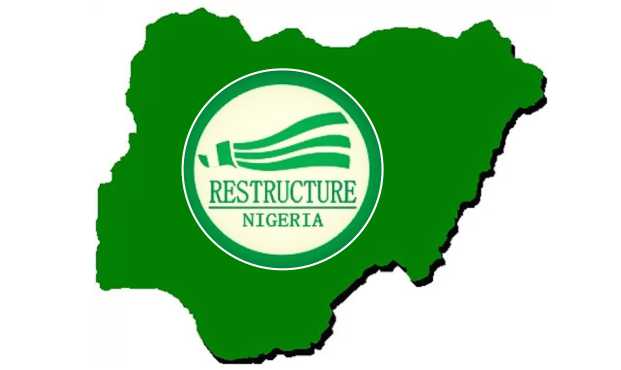Since the inception of the President Muhammadu Buhari-led administration, there have been calls for restructuring. This current system being practiced in Nigeria has failed the whole country. The whole country is on fire.
What is the way out? Regionalism or restructuring is the answer.
It has worked for us before but the only defect is that it promoted ethnic loyalty but on the contrary, regionalism brought development into the country. The three regions were highly competitive and this brought about rapid development.
The problem in our country is that we avoid honest dialogue, which sometimes involves telling ourselves uncomfortable truths. The cries of marginalisation, restructuring, and secessionist tendencies are, at their core, a cry for justice in our country.
Read Also: Shehu Sani: Why The North Is Scared Of Restructuring
This current system of governance in practice only makes the politicians lazy. Most of the states are in financial trouble because of the failure of past and successive governments to prepare for the worst. With an improved regional system, the problem of laziness would be curbed to a large extent. It was under regionalism that Nigeria was a pride to Africa. Do not also forget that when Nigeria was practicing regionalism, there was no oil yet discovered. Now that we are in a world whereby oil is falling; regionalism is the answer to Nigeria’s wake up call.
More so, restructuring is a song also on the lips of many Nigerians. It has trended for decades and seems to be an inter-generational topical issue in Nigeria. The persistent call for restructuring takes numerous dimensions, but particularly outstanding is in the dimension of politics.
Thus, national debate and calls for restructuring are nothing new, but they continue to grow amid economic stress, political uncertainty, and recurrent violent conflicts across the country. Especially, ahead of the February 2019 elections, the push for restructuring of Nigeria’s political system is gaining momentum. Groups from the south, which have long championed the call for restructuring in defense of regional economic development, are particularly vocal in their demands for upending the current centralisation of political power.
The truth is that whoever holds back or tries to suppress calls for restructuring Nigeria is simply delaying the inevitable. Nigeria is not working. Nowhere in the developed world do we encounter a replica of Nigeria in terms of its approach to education, the economy, managing ethnicity, and development policies. Oil in its crude and unprocessed form is the mainstay of the economy. The refineries are not functioning at full capacity. A
fter nearly 60 years of independence and discovery of oil in commercial quantity, we still import finished products from other oil-producing countries. The states, ostensibly the federating units of the federation are not economically viable. The Federal Government pretends to manage secondary education and universities nationwide. But it is not working.
Nation-building is hard, but it need not be as difficult as we make it in Nigeria. Nation-building is also intentional. It doesn’t happen by accident. The real test is in the leadership and the actions that create a real spirit of nationhood, and the willingness of every stakeholder to build a united, stable, and cohesive nation.
Restructuring is important because the country needs justice and equity. Anyone can make disingenuous arguments, but the current constitutional structure of Nigeria and the concentration of power at the center in Abuja favors some parts of the country and disenfranchises others, in particular those parts of the country from which the natural resources rents support the current structure. It disenfranchises them because they have no control over these resources (which should not be the case in a truly federal state), and also because the arrangement places excessive political power in the hands of whichever groups control power at the center.
Second, restructuring is necessary because of the destabilisation that the current conditions have bred. We can either stabilize Nigeria by restructuring it, or continue to play the ostrich by insisting that our “processes”, not the structure, are the problem. High-intensity conflicts, killings, and bandit attacks will continue in various parts of the country, with the theatres of conflict shifting to different regions at different times (South-South, Southeast, Middle Belt in the North-Central, Northeast, and so on).
Restructuring also is essential because it will help our democracy achieve better governance. The periodic rituals of elections have not necessarily improved governance. There are two ways this will happen. One, restructuring will bring greater accountability and transparency to governance because power and responsibility will devolve closer to the people. This will help evolve a better culture and quality of leadership, and will also foster competitive development between the regions.
AFRICA TODAY NEWS, NEW YORK

